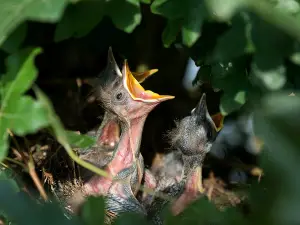
Baby birds go through a number of developmental stages before they grow into fully grown adults. After the hatching stage, these birds learn how to chirp, eat, drink, look for their own food, and fly.
This all happens over a period of weeks and months. If your baby bird is chirping, you may be asking yourself, ‘Why do baby birds chirp?’ This article explores this question.
Baby birds use chirping as a means of communicating with each other and with adult birds. There are a variety of reasons why baby birds chirp including: needing attention, hunger, excitement, fear, the presence of food, and disorientation to name a few
Table of Contents
Why do baby birds chirp?
The sound of baby birds chirping may be irritating to some humans, especially if this chirping happens at night, but these little creatures chirp for good reason. Because these animals cannot speak as humans can, they communicate through chirping. They chirp to communicate:
Hunger: If the parent bird is close by, but isn’t feeding the baby as often as it needs to be fed, then the baby may chirp. Baby birds need to be fed quite often, their crops are small and need to be filled regularly
Thirst: Baby birds, just as humans, get thirsty. These animals will vocalize their thirst as soon as it strikes. Baby birds can easily become dehydrated if they do not have access to water. Adult birds can also become dehydrated, but dehydration can be especially detrimental to baby birds
Too hot or too cold temperatures: Baby birds will complain by chirping if they’re feeling too hot or too cold. If they’re feeling too cold, they will huddle under a heat lamp. If they feel too hot, they will keep away from sources of heat and each other.
Disorientation: Generally, baby birds are meant to be up during the day and asleep at night. If a baby bird is disoriented, it may start to chirp through the night. The most common reason for this is light pollution at night. Birds aren’t able to tell the difference between natural and artificial light. Lights switched on during the night can cause birds to think it’s still morning
Danger: When baby birds are in danger, they chirp and make other noises; this is their way of responding to an imminent threat and alerting their parent birds of danger. Distressed baby birds will sound the alarm by chirping loudly, chirping also communicates that the baby bird is scared.
Mimicking parents: Adult birds create bird calls and bird songs by chirping. Baby birds try to mimic what their parents do and start chirping to create songs and bird calls, too. This is an important social skill for a variety of birds, and it’s a survival skill as well.
They need care: Just as human babies need care and attention from their parents, baby birds also need care and attention from their parents. The only way baby birds know how to communicate their need for care is to chirp in hopes of getting their parents’ attention
Excitement: Baby birds form a bond with their parents. This attachment is created as the adult bird takes care of the baby, feeds the baby, and protects the baby. When a parent comes back from searching for food, the baby becomes excited to see it and starts to chirp.
Presence of food: Baby birds may be young, but they do understand what food is, in fact, they get excited when food is given to them. Chirping is one way that these animals express excitement. Baby birds may even fight each other and get into squabbles over food
Illness: Baby birds will chirp in a slow, unenthusiastic way if they are sick; they may also chirp with their eyes closed and isolate themselves when they are sick. They isolate themselves to avoid spreading their illness to other birds. Take your baby bird to a vet when you notice this happening.
FAQ:
What does it mean when you hear birds chirping at night?
There are many different reasons as to why birds may chirp at night; these include the bird wanting to attract mates, trying to claim or protect their territory, warning other birds of danger, wanting to communicate with other birds during migration.
How do you calm a baby bird?
If your baby bird is reacting badly, or is anxious and needs to calm down, then you can hold the bird on your chest to calm it down.
You can also leave the bird in a dim room, a room that’s warm and quiet, this should help the bird calm down
Conclusion
In conclusion, birds chirp as a means of communication. They will chirp to communicate hunger, thirst, extreme temperatures, the need for care, excitement, because they are ill, excitement over food, as a way to mimic their parents, when they feel fear, and if they are disorientated.
If you enjoyed this article then you may also be interested in other pigeon related articles. Here are some articles that you may be interested in: Do baby birds eat as soon as they hatch?, Can baby birds eat rice?, Why do baby birds open their mouths?, Do baby birds carry diseases?

